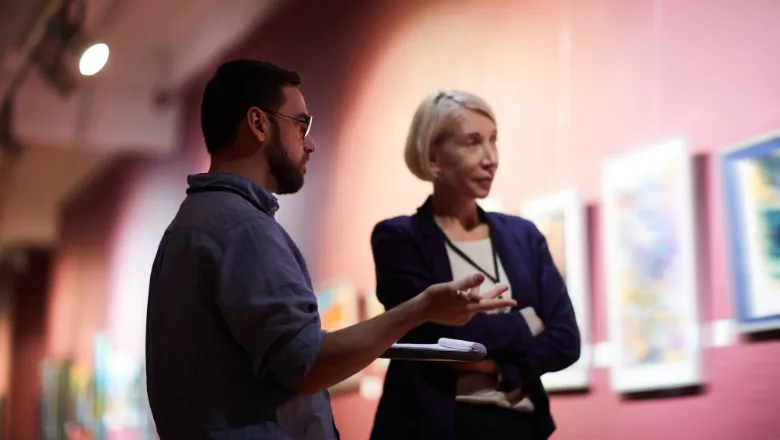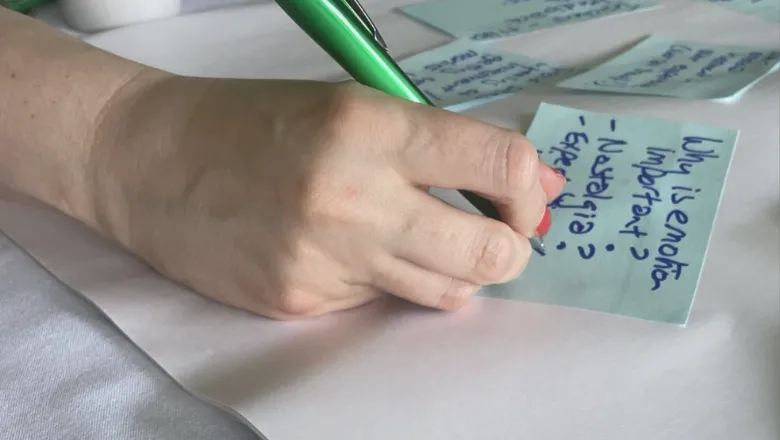This Royal Society of Edinburgh funded project has provided the opportunity to build a network of individuals and organisations who are keen to understand more about how museum workers experience and use their emotions. From this research we have started to understand where gaps in our understanding remain and which key areas for future research should be targeted.
Dr Anna Woodham, Senior Lecturer in Museum & Heritage Studies
11 February 2025
Research sheds light on emotionally laden work in museums
Findings from a New Futures of Care pilot study show that workers in museums and heritage organisations experience tension between the privilege of working in the sector and guilt over the limitations and challenges of specific roles.

New Futures of Care is led by Dr Anna Woodham, Fellow of the Global Cultures Institute and Senior Lecturer in Museum & Heritage Studies in the Department of Culture, Media and Creative Industries, and Dr Jennie Morgan, Senior Lecturer in Heritage at the University of Stirling.
The project, funded by the Royal Society of Edinburgh, aims to encourage the exchange of experiences and use of emotions in museum work, give greater visibility to the emotional aspects of the role, and build understanding of this hidden practice area. The subject has received little attention yet is of growing scholarly and sector concern, with museums increasingly operating in contexts of urgent change, such as tackling themes of anti-racist, decolonial practice and climate justice.
The findings from the pilot are reported in New Futures of Care: Investigating emotionally laden work in museums, which Dr Woodham and Dr Morgan presented to the Radical Rest Network on 5 February. Their talk focused on how workers in UK museums articulate, experience and utilise emotions in their professional lives.
Ultimately, the project aims to support worker wellbeing, as links between emotions and wellbeing are not always valued or legitimised within the sector, which can negatively impact staff.

To gather the data, the academics ran two exploratory workshops (pictured above) for museum and heritage professionals, academic researchers, and policymakers, providing space to discuss the emotions used and experienced in museum work.
Dr Woodham and Dr Morgan discovered that a wide range of emotions co-exist in specific roles and activities, and participants often struggled to explain the emotions they experience in their work, suggesting that these are largely felt, embodied experiences. People in public-facing roles experienced higher demand on their emotions, yet the emotional impact extends far beyond these roles.
There is a desire to better understand and support the emotionally laden work, with structural and cultural change required to recognise and value the range of emotions experienced. However, practical interventions may also help staff to feel supported, such as regularly reviewing the emotional ‘touchpoints’ of specific roles.
As organisations that care for people, collections, place, stories, identities, values, the environment, the past, present and future, museum and heritage work appears distinctive from other sectors. We need to understand these distinctions better so that we know how to improve support for workers.
Dr Anna Woodham, Senior Lecturer in Museum & Heritage Studies
Dr Woodham and Dr Morgan have previously discussed the project and its findings at the Social History Curators’ Group Conference, the Museums Association Members Together event, and the Museums, Health and Wellbeing Conference at the University of Amsterdam.
Results from the New Futures of Care pilot will inform Dr Woodham’s Fellowship with the Global Cultures Institute on the emotional labour of employees across galleries, libraries, archives, and museums (GLAM), which she is developing into a larger research grant.

